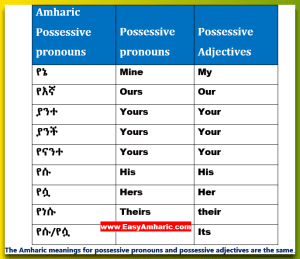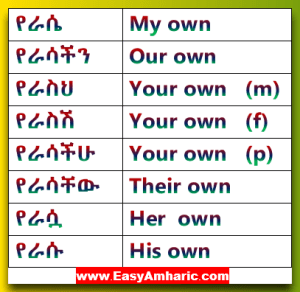Amharic Parts of Speech
Amharic Possessive pronouns
Possessive pronouns are used to indicate ownership or possession. They show that something belongs to someone. In Amharic possessive pronouns and possessive adjectives are the same

As you can see above, the Amharic meanings for possessive pronouns and possessive adjectives are the same.
The words in red are possessive pronouns.
የራሴ / የኔ = Mine
(Used to indicate something belongs to the speaker.)የራሳችን / የእኛ = Ours
(Used to indicate something belongs to the speaker and others.)የራስህ / ያንተ = Yours (masculine singular)
(Used to indicate something belongs to a male person being spoken to.)የራስሽ / ያንቺ = Yours (feminine singular)
(Used to indicate something belongs to a female person being spoken to.)የራሳችሁ / የናንተ = Yours (plural)
(Used to indicate something belongs to a group of people being spoken to.)
የራሱ / የእሱ = His
(Used to indicate something belongs to a male person being talked about.)የራሷ / የእሷ = Hers
(Used to indicate something belongs to a female person being talked about.)የራሳቸው / የነሱ = Theirs
(Used to indicate something belongs to a group of people being talked about.)
- ይህች ድመት የእኔ እንጂ የአንተ አይደለችም።። (This cat is mine, not yours.)
- እሱ የኔ አይደለም፣ ያንተ ነው። (It is not mine, it is yours.)
- ይህ ቦታ የነሱ ነው። (This place is theirs.)
Let’s continue with similar and frequently used phrases:
| የእኔን ስጠኝ | Give me mine |
| ገንዘቤን ስጠኝ | Give me my money |
| የራሴን ገንዘብ ስጠኝ | Give me my own money |
| የሱን ስጠው | Give him his |
| ገንዘቡን ስጠው | Give him the money |
| የሷን ስጣት | Give her hers |
| ገንዘቡን ስጣት | Give her the money |
| የራሷን ገንዘብ ስጣት | Give her her own money |
| ገንዘባቸውን ስጣቸው | Give them their money |
Speaking about possession, let me add some additional but helpful Amharic words below.

So, you might ask, “When do we use these words?”
This is a great question. We use them in some different situations. For instance, when people are very annoyed, they use these words and then add the word ጉዳይ, which means problem, affair, issue, or matter. Let’s see some Amharic examples:
- የራሱ ጉዳይ ባክህ = His own affair; I don’t care; leave him.
- የራስሽ ጉዳይ = Your own affair (to a female).
- የራስህ ጉዳይ = Your own affair (to a male).
- የራሳችሁ ጉዳይ = Your own affair (to a group).
- የራሷ ጉዳይ ባክህ = Her own affair; leave her.
- የራሳቸው ጉዳይ ባክህ means I don’t care; it’s their matter/business.
- እኔ ስለነሱ አያገባኝም። means It is not my business.
- የራሳቸው ጉዳይ ባክህ፣ እኔ ስለነሱ አያገባኝም። = I don’t care; leave it; it is not my business.
Saying “የራሱ ጉዳይ” means ” I don’t care. It doesn’t concern me. Leave it. Let it be. Don’t worry, etc.
The phrase የራሱ ጉዳይ (or its variations) is used to express disinterest or dismissiveness toward someone else’s actions or problems. It’s a way of saying, “That’s their business, not mine,” or “I don’t care.” The addition of “ባክህ” (or “ባክሽ” for feminine) softens the tone slightly, meaning “leave it” or “let it be.”
Lesson Summary:
I appreciate that you read this very short (537 words) lesson all the way to the end.
In this lesson, we learned about possessive pronouns and possessive adjectives. Even if you feel you understand them, I encourage you to review them again. Re-reading helps reinforce the information and store it in your long-term memory.
In the next lesson, we will learn about Amharic reflexive nouns.
But before that, make sure to understand this lesson well and complete the quizzes below.